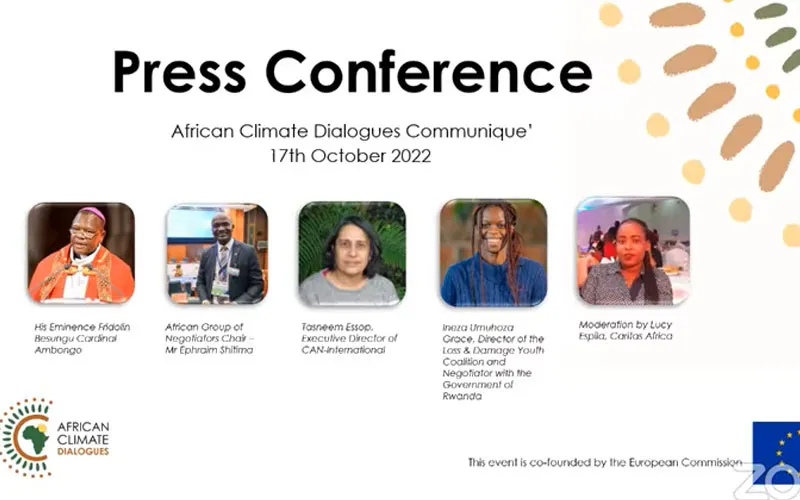The African Climate Dialogues is an initiative bringing together Church and civil society actors as well as allies including communities and religious leaders from across the African continent and European organizations.
From July to September, five sessions of the African Climate Dialogues were held. These were: False Climate Solutions and the Congo Basin; Food Systems, agriculture and adaptation; Finance; Loss and Damage and Adaptation; and Climate-Induced Migration and Displacement.
Each of these sessions saw a diverse list of stakeholders and experts come together to discuss and reflect on their experience, with a special emphasis on the moral and spiritual dimensions of the climate crisis and what action is needed at COP27.
Participants were invited to respond to expert presentations, dialogue with each other and contribute to a shared output.
The communiqué, which SECAM and members of the African Climate Dialogues launched on October 17 was the culmination of what was deliberated upon in these sessions.
(Story continues below)
On False Climate Solutions and the Congo Basin, the participants in the African Climate Dialogues have, among other proposals, underscored the need to transform Africa’s fossil fuel energy system to one that is powered by renewable energy sources in order to fairly and equitably provide energy for people and promote energy sovereignty, and to protect the rights of communities and ecosystems while at it.
The participants have also underlined the need to promote peace and regional integration in Africa, especially in the Congo Basin, by protecting ecosystems, regenerate Lake Chad basin, respecting human rights, establishing and enforcing binding regulations and the rule of law, and sensitizing the public on climate change impacts.
They have further expressed the need to establish and restore community-based management of natural resources like forests, rangelands and fishing grounds, and to transition to new sources of energy that are locally produced, cheap, accessible and benefit local and indigenous communities in Africa.
On Food Systems, Agriculture and Adaptation, members of the African Climate Dialogues have found it necessary to make agroecology a prominent theme at COP27.
Among a set of key issues on Climate Finance, the participants say that the Global North “must pay” the ecological debt it owes to the Global South.
They further underscore the need to provide new, accessible, adequate, predictable and additional climate finance from public sources that supports the needs of people and local communities.
The faith-based entities and civil organizations also underline the need to provide a loss and damage finance facility at COP27 funded by penalties levied against private and public sector polluters based on well-defined measurements including from public sources.
“Faith leaders, including the Holy See, senior Church leaders, and the Bishops of Africa, should speak out in support of civil society on the issue of loss and damage at COP27,” the participants in the dialogues have said.
SECAM and members of the African Climate Dialogues have also, in their sessions, discussed the issue of Climate-Induced Migration and Displacement and highlighted the strong interconnection between climate, migration, conflict and food security. This situation, they have said, requires urgent awareness, comprehensive policies, better nexus between humanitarian and sustainable development aid, and adequate financing.
Agnes Aineah is a Kenyan journalist with a background in digital and newspaper reporting. She holds a Master of Arts in Digital Journalism from the Aga Khan University, Graduate School of Media and Communications and a Bachelor's Degree in Linguistics, Media and Communications from Kenya's Moi University. Agnes currently serves as a journalist for ACI Africa.








